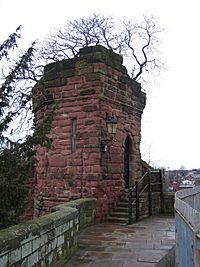Bonewaldesthorne's Tower facts for kids
Quick facts for kids Bonewaldesthorne's Tower |
|
|---|---|

Bonewaldesthorne's Tower from Chester city walls
|
|
| Location | Chester, Cheshire, England |
| OS grid reference | SJ 400 665 |
| Built | By 1249 |
| Rebuilt | 1322–26 |
|
Listed Building – Grade I
|
|
| Official name: Bonewaldesthorne tower | |
| Designated | 28 July 1955 |
| Lua error in Module:Location_map at line 420: attempt to index field 'wikibase' (a nil value). | |
Bonewaldesthorne's Tower is an old building from the Middle Ages. It stands on the northwest corner of the city walls in Chester, Cheshire, England. A short wall connects it to the nearby Water Tower. This tower is a very important historical site. It is officially listed as a Grade I building. This means it is a special building that needs to be protected. The tower was first built to help defend Chester. Later, in the 1800s and early 1900s, it became a museum.
Contents
The Tower's Story
Early Days and Rebuilding
People have known about Bonewaldesthorne's Tower since at least 1249. It was either rebuilt or changed between 1322 and 1326. After this, it became the entrance gate to the Water Tower. Imagine it as a strong doorway leading to another important part of the city's defenses.
From Defense to Museum
In 1835, a group called the Chester Mechanics' Institution was started. They wanted to open a museum to show off their collections. The city council let them use both the Water Tower and Bonewaldesthorne's Tower for this. They paid only a very small rent. The museum first opened its doors in 1838.
The tower became a place for learning and discovery.
- In 1840, a camera obscura was put in the tower. This is a device that projects an image of its surroundings onto a screen. It was like an early projector!
- In 1848, an observatory was added. This allowed people to look at the stars and planets.
- A statue of Queen Anne was also placed on the tower's steps. This statue had been in another building that had burned down.
Changes Over Time
The Mechanics' Institution closed in 1876. The city council then took over all the museum items. People knew the tower wasn't the best place for a museum. But at the time, there was nowhere else big enough to show everything.
The tower museum closed for a short time in 1901–1902. This was because the city walls were being rebuilt. It opened again in 1903. That year, about 12,000 people came to visit! The towers were closed to the public in 1916. In the 1920s, they were rented out for other uses, not as a museum.
Modern Museum Life
In 1954, the Grosvenor Museum bought the towers. They reopened them to the public in 1962. Since August 2016, Bonewaldesthorne's Tower and the Water Tower have been home to a museum called 'Sick to Death'. This museum teaches visitors about the history of medicine.
Tower Design
Bonewaldesthorne's Tower has a rectangular shape. It is built from red sandstone. The stones are laid in neat rows, like bricks. The tower stands on a tall base, called a plinth.
To get into the tower from the city walls, you walk up seven steps to an arched doorway. On the other side, another doorway leads to the short wall that connects to the Water Tower. The very top of the tower has battlements. These are the parts of a castle wall with gaps for shooting arrows. Inside the tower, there is a fireplace. There is also a hidden staircase. A single narrow window lets light into the staircase.

